 As technology has advanced over the last several decades, each innovation has built and improved upon previous concepts. For example, in the area of electrical thermal management, air conditioning (and later, air compression) used to be the standard solution. Yet, as electrical equipment and technology advanced, innovators improved the concepts of thermal management based on what those previous solutions taught them. For example, heat exchangers improved the process by eliminating many of the characteristics that made older thermal management technologies cumbersome, including the manner in which they control electrical waste heat. In doing so, they helped companies that rely on them become much more efficient in several different ways. (more…)
As technology has advanced over the last several decades, each innovation has built and improved upon previous concepts. For example, in the area of electrical thermal management, air conditioning (and later, air compression) used to be the standard solution. Yet, as electrical equipment and technology advanced, innovators improved the concepts of thermal management based on what those previous solutions taught them. For example, heat exchangers improved the process by eliminating many of the characteristics that made older thermal management technologies cumbersome, including the manner in which they control electrical waste heat. In doing so, they helped companies that rely on them become much more efficient in several different ways. (more…)
Do Medical Devices Use Heat Exchangers?
 Technology has always impacted the medical industry differently than others. For example, given the complexity of the industry and the interconnectedness of different organizations, healthcare has typically been slower than other fields to fully adopt certain technologies. At the same time, some of the most advanced technological innovations break ground in the medical field, where technology can dramatically impact the quality of patients’ healthcare. As the industry adopts increasingly more forms of advanced technology, the role of modern heat exchangers in the medical field becomes increasingly more prominent. That’s largely because of their ability to consistently and reliably control large amounts of electrical waste heat. However, it’s also because heat exchangers are designed in such a away as to optimize the safety of employees and patients who remain near them. (more…)
Technology has always impacted the medical industry differently than others. For example, given the complexity of the industry and the interconnectedness of different organizations, healthcare has typically been slower than other fields to fully adopt certain technologies. At the same time, some of the most advanced technological innovations break ground in the medical field, where technology can dramatically impact the quality of patients’ healthcare. As the industry adopts increasingly more forms of advanced technology, the role of modern heat exchangers in the medical field becomes increasingly more prominent. That’s largely because of their ability to consistently and reliably control large amounts of electrical waste heat. However, it’s also because heat exchangers are designed in such a away as to optimize the safety of employees and patients who remain near them. (more…)
How Heat Pipes Transfer Heat Efficiently
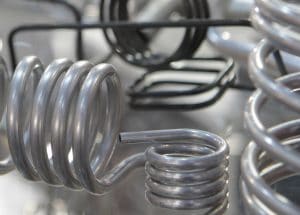 Over the last several decades since heat exchangers first became popular, they’ve undergone several different iterations, each one offering even more efficient and reliable thermal management. One of the most common and versatile iterations is the advent of heat pipes, which are high-performance heat spreaders that can fit into unique spaces and offer optimal heat transfer for advanced applications. Heat pipes are crafted from metal and lined inside with an absorbent capillary wicking material. Their innovative design allows them to absorb impressively high levels of electrical waste heat consistently and uniformly, all while minimizing the amount of space you need to designate to a system’s cooling apparatus. (more…)
Over the last several decades since heat exchangers first became popular, they’ve undergone several different iterations, each one offering even more efficient and reliable thermal management. One of the most common and versatile iterations is the advent of heat pipes, which are high-performance heat spreaders that can fit into unique spaces and offer optimal heat transfer for advanced applications. Heat pipes are crafted from metal and lined inside with an absorbent capillary wicking material. Their innovative design allows them to absorb impressively high levels of electrical waste heat consistently and uniformly, all while minimizing the amount of space you need to designate to a system’s cooling apparatus. (more…)
Advantages that Come with Streamlining Thermal Management
 When compared to air conditioners, the advantages of heat exchangers seem obvious. The most notable one is streamlining electrical thermal management by eliminating their reliance on air conditioning equipment. That means the high costs of implementing, running, maintaining, and repairing air conditioners no longer had to be accepted as par for the course. However, given the many important roles that thermal management has to a wide variety of applications, streamlining it provides an even wider variety of advantages. (more…)
When compared to air conditioners, the advantages of heat exchangers seem obvious. The most notable one is streamlining electrical thermal management by eliminating their reliance on air conditioning equipment. That means the high costs of implementing, running, maintaining, and repairing air conditioners no longer had to be accepted as par for the course. However, given the many important roles that thermal management has to a wide variety of applications, streamlining it provides an even wider variety of advantages. (more…)
Industries that Heat Exchangers Make More Efficient
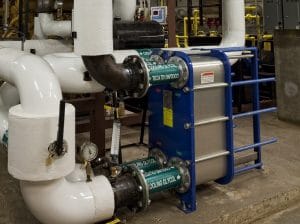 These days, nearly every industry relies on technology, the range of which is virtually limitless. Because all technology relies on efficient thermal management solutions, most industries have benefited from the widespread adoption of advanced heat exchangers. Everything from control panels for large electrical systems to faster, more powerful, and more efficient handheld devices now benefit from the efficient heat transfer capabilities of heat exchangers. Therefore, industries that rely on such technologies have been able to streamline their operations on several different fronts, the sum of which equals significantly improved efficiency and productivity. (more…)
These days, nearly every industry relies on technology, the range of which is virtually limitless. Because all technology relies on efficient thermal management solutions, most industries have benefited from the widespread adoption of advanced heat exchangers. Everything from control panels for large electrical systems to faster, more powerful, and more efficient handheld devices now benefit from the efficient heat transfer capabilities of heat exchangers. Therefore, industries that rely on such technologies have been able to streamline their operations on several different fronts, the sum of which equals significantly improved efficiency and productivity. (more…)
What Makes Heat Exchangers Different?
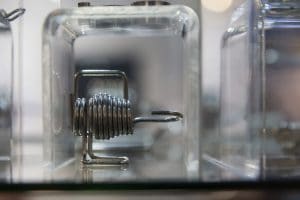 The concepts that guide modern electrical thermal management have evolved significantly over the years, and they’ve led to a variety of expanding possibilities for newer and more efficient technologies. One of the most popular and often relied-on concepts is that of phase-change cooling, which powers many of today’s most advanced heat exchangers. The simple, effective, and eco-friendly method of transferring waste heat makes heat exchangers viable for a wide range of applications. (more…)
The concepts that guide modern electrical thermal management have evolved significantly over the years, and they’ve led to a variety of expanding possibilities for newer and more efficient technologies. One of the most popular and often relied-on concepts is that of phase-change cooling, which powers many of today’s most advanced heat exchangers. The simple, effective, and eco-friendly method of transferring waste heat makes heat exchangers viable for a wide range of applications. (more…)
Should You Retrofit Old Tech with Heat Exchangers?
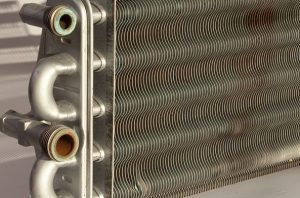 Heat exchangers have become popular enough that many forms of new technology incorporate them into their initial designs. Others are easy to upgrade with appropriate heat exchangers to boost their efficiency and productivity. However, sometimes, technology itself doesn’t need to be replaced, just its thermal management system. For such cases, it may be a good idea to retrofit the application with an appropriate, custom thermal management solution. Today, heat exchangers come in enough of a variety to meet the specific needs and demands of most applications. For those with older, specialized requirements, heat exchangers can often be customized for optimal results. (more…)
Heat exchangers have become popular enough that many forms of new technology incorporate them into their initial designs. Others are easy to upgrade with appropriate heat exchangers to boost their efficiency and productivity. However, sometimes, technology itself doesn’t need to be replaced, just its thermal management system. For such cases, it may be a good idea to retrofit the application with an appropriate, custom thermal management solution. Today, heat exchangers come in enough of a variety to meet the specific needs and demands of most applications. For those with older, specialized requirements, heat exchangers can often be customized for optimal results. (more…)
Technologies that Rely on Heat Exchangers
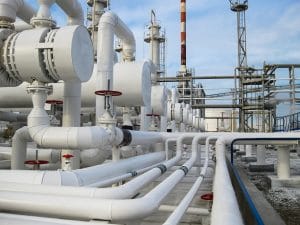 The many different uses that technology companies and designers find for heat exchangers these days comprise an impressive list. It belies the technology’s humble beginnings as an alternative to air conditioners for cooling electrical cabinets. Today, heat exchanger technology comes in so many different forms and functions that it’s become integral to much more than just cooling control panels. In fact, some of the most advanced technologies have been made possible because of the innovative thermal management processes provided by today’s heat exchangers. (more…)
The many different uses that technology companies and designers find for heat exchangers these days comprise an impressive list. It belies the technology’s humble beginnings as an alternative to air conditioners for cooling electrical cabinets. Today, heat exchanger technology comes in so many different forms and functions that it’s become integral to much more than just cooling control panels. In fact, some of the most advanced technologies have been made possible because of the innovative thermal management processes provided by today’s heat exchangers. (more…)
How to Make Electrical Cooling Eco-Friendly
 These days, technology has to do more than just work. Eco-friendliness and energy conservation are top priorities in all industries and are just as important as productivity and efficiency. Therefore, technology has to be designed to meet those needs in order to be useful for the companies that implement it. That’s one of the reasons why heat exchangers have become such a popular electrical cooling solution. They rely on thermal management processes that epitomize eco-friendliness, and they those same processes allow heat exchangers to operate with minimal energy consumption. The secret lies in how heat exchangers transfer heat and the innovative ways in which they can be designed to fit virtually any application’s specific requirements. (more…)
These days, technology has to do more than just work. Eco-friendliness and energy conservation are top priorities in all industries and are just as important as productivity and efficiency. Therefore, technology has to be designed to meet those needs in order to be useful for the companies that implement it. That’s one of the reasons why heat exchangers have become such a popular electrical cooling solution. They rely on thermal management processes that epitomize eco-friendliness, and they those same processes allow heat exchangers to operate with minimal energy consumption. The secret lies in how heat exchangers transfer heat and the innovative ways in which they can be designed to fit virtually any application’s specific requirements. (more…)
Thermal Management that Doesn’t Require Constant Attention
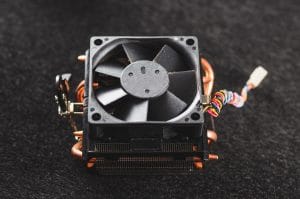 Over the last century, technology of all types has advanced at a more rapid pace than ever before, and heat exchangers have played a vital role in many of those advancements. Simply allowing for more efficient and reliable ways to manage waste heat has provided innovators the freedom to create more powerful and compact designs than ever before. In more recent decades, most technological innovations have focused on allowing the humans that use them to be more productive with their time. This includes various forms of automated technology and equipment that are designed to operate with minimal or no human interaction. For such solutions to work, they require thermal management systems that are just as automated, which has made heat exchangers even more vital to such technology’s success. (more…)
Over the last century, technology of all types has advanced at a more rapid pace than ever before, and heat exchangers have played a vital role in many of those advancements. Simply allowing for more efficient and reliable ways to manage waste heat has provided innovators the freedom to create more powerful and compact designs than ever before. In more recent decades, most technological innovations have focused on allowing the humans that use them to be more productive with their time. This includes various forms of automated technology and equipment that are designed to operate with minimal or no human interaction. For such solutions to work, they require thermal management systems that are just as automated, which has made heat exchangers even more vital to such technology’s success. (more…)







